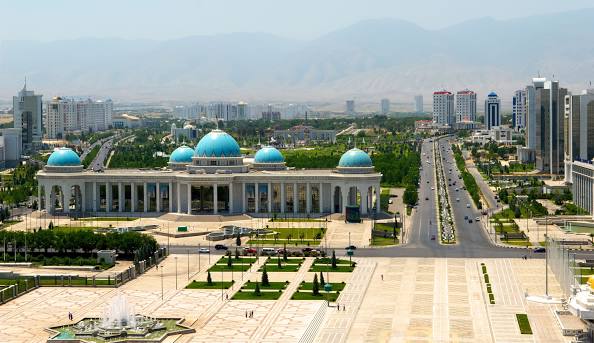An index evaluating cities based on their long-term capacity to preserve investor wealth in the future.
Introduction
The future wealth will be preserved by smart and sustainable cities. Hence, we created the Smart & Sustainable Cities Index (SSCI), which ranks 25 pre-selected cities from the 2025 Wealth Preservation Index expected to offer superior long-term conditions for wealth preservation. This index focuses on three pillars critical to future urban sustainability and investment confidence: digital readiness, climate resilience, and political stability. By integrating both city- and country-level data, the index provides a balanced and forward-facing perspective on systemic risks and adaptive capacity.
%202025.png)
Key Findings
#1—Wellington: Ranks first for its exceptional climate resilience and trusted governance, even though its digital infrastructure still has room to improve.
#2—Copenhagen: Takes second place by combining high livability with strong sustainability efforts and urban planning.
#3—Singapore: Leads among global financial centers, scoring high in digital infrastructure, regulatory stability, and climate adaptation, despite some environmental exposure.
Methodology
The index evaluates a city’s long-term potential for wealth preservation using three weighted metrics: Digital Readiness (25%), Climate Resilience (50%), and Political Stability (25%). Each metric reflects a critical pillar of future-proof urban environments and is constructed using standardized, min-max normalized data to enable cross-city comparisons.
1. Digital Readiness
This metric captures a city’s ability to deploy and integrate digital infrastructure to enhance resilience and quality of life. It uses the IMD Smart City Index, which reflects residents’ perceptions of digital services and infrastructure [1].
Raw IMD Smart City scores were rescaled using min-max normalization across the sample of 25 cities to standardize the values on a 0–1 scale:
Normalised Value = (χ-χmin )/(χ max- χmin )
2. Climate Resilience
Climate resilience measures both a city’s exposure to environmental risk and its adaptive capacity. It combines:
- City-level data (65%) from the Oxford Economics Global Cities Index 2025, incorporating PM2.5 levels, CO₂ intensity, natural disaster severity, and climate anomalies [2].
- Country-level data (35%) from the ND-GAIN Index, capturing national readiness for climate adaptation [3].
3. Political Stability
This metric evaluates the predictability and reliability of governance, crucial for long-term economic planning. It combines:
- City-level governance score (65%) from the Oxford Economics Global Cities Index, covering institutional quality, business environment, and civil liberties [2].
- Country-level political stability score (35%) from the World Bank Governance Indicators (WBGI) [4].
In the end, each city gets one overall score that reflects how well it can protect wealth in the future, where cities with higher scores are more resilient, stable, and ready for long-term success.
Observations
- Sydney (8th), Melbourne (10th), and Vancouver (11th) illustrate the benefits of living in well-governed federations with strong livability and resilience metrics.
- Seattle (16th) and San Francisco (18th), despite technological strength, rank lower due to climate risks, particularly wildfires and rising temperatures.
- Tel Aviv’s low ranking (24th) is primarily driven by high geopolitical volatility and environmental stress.
- Dubai (25th) and Abu Dhabi (23rd) rank low due to poor climate resilience, underscoring how climate risks are reshaping long-term city appeal, even as both cities plan to improve in the coming years.
- Hong Kong (20th), Macau (22nd), and Dubai (25th) show that strong digital infrastructure can't outweigh the impact of climate vulnerability or political instability.
When Control Isn’t Enough: Understanding External Risks to Wealth with Gabrielle Reid, Head of Insights at Multipolitan

In today’s volatile global landscape, individual wealth is increasingly exposed to forces outside personal control. From emerging geopolitical shifts disrupting capital flows, domestic political changes reshaping tax regimes, or macroeconomic headwinds eroding purchasing power, external pressures can undermine the real value of personal assets. For individuals focused on safeguarding their wealth, the local environment plays a critical role. In this context, where you live can matter as much as how you invest when it comes to wealth preservation.
This insight underpins Multipolitan’s development of the 2025 Wealth Preservation Index, which ranks the top 25 global cities that best preserved individual wealth over the past decade. The index uses a two-stage methodology that first assesses national-level economic and fiscal fundamentals before drilling into city-specific metrics like property values, earning potential, and quality of life measures. The goal is to provide a comparative framework for evaluating how cities offer protections to personal wealth in real terms.
Know Your Country
Before accounting for city specifics, there are ever-present national-level fundamentals that can have a real impact on individual wealth. Key macroeconomic indicators such as GDP per capita, exchange rate volatility, and inflation directly influence purchasing power. These indicators are shaped by domestic policy as well as global shocks. Geopolitical tensions, commodity price swings, and supply chain disruptions can affect GDP growth and currency stability. Inflation, in particular, is vulnerable to external forces such as energy price spikes and currency depreciation.
At the same time, a country’s tax posture can present a direct burden to individual wealth. High income taxes, capital gains levies, and inheritance taxes can reduce disposable income, erode asset values, and complicate intergenerational wealth transfers. Complex or shifting regulations add further burdens. For mobile individuals and families with diverse portfolios, a country’s tax posture is as crucial to wealth management, planning investment returns, or inflation protection.
To capture these dynamics, Multipolitan’s 2025 Wealth Preservation Index assessed macroeconomic dynamics and tax volatility across 196 countries between 2015 and 2025, eliminating jurisdictions with inherent political or macroeconomic volatility or systemic tax drag. Notably, Japan and China were excluded from the subsequent city-level analysis on our assessment due to high taxes and macroeconomic volatility, despite hosting wealthy cities like Tokyo and Shanghai. While these cities are global financial hubs, our findings show that strong institutional wealth does not automatically equate to strong conditions for preserving individual wealth.
A Tale of Two Cities
Although country-level dynamics have a direct impact on individual wealth preservation, city-level differences can have equally important impacts, with two cities within the same country offering divergent prospects for wealth preservation. In our study, we selected the largest cities by GDP per capita within our qualifying countries, including up to three cities for larger jurisdictions. We then compared significant changes in fundamentals believed to be primary contributors to wealth preservation – property value, earning potential, and the liveability or quality of life within a city.
This analysis produced the top 25 cities for wealth preservation from 2015 to 2025. Zug, Hong Kong, and Basel lead the index, demonstrating consistent asset performance, income stability, and high quality of life. Zug, in particular, stood out for improved liveability and a stable tax environment, while Hong Kong retained strength in property markets. Cities like Vilnius, Reykjavik, and Yerevan posted the highest inflation-adjusted property price gains but were ranked lower overall due to their modest starting values. In contrast, cities such as Kuwait City and Sofia suffered from declining liveability scores, underscoring how environmental or political deterioration can offset economic growth. These findings illustrate the importance of looking beyond headline economic data. Wealth preservation depends not just on financial outcomes, but on whether cities can sustain a high standard of living amid inevitable change.
Looking Ahead: Risk, Resilience, and the Future of Wealth
The past decade offers lessons to us all, not least that a lot can change in 10 years. For investors, choosing where to invest today to secure returns tomorrow requires a forward-looking approach to understanding location-based resilience. To support this approach, Multipolitan developed a companion Smart & Sustainable Cities Index (SSCI), evaluating the same 25 cities for their readiness to face systemic risks such as digital disruption, climate change, and political instability that may undermine their future resilience and ability to offer wealth preservation in the longer term.
With floods, fires, and temperature anomalies becoming more frequent and severe, climate resilience remains the top consideration for the future. Using environmental sub-scores from the Oxford Economics Global Cities Index and national ND-GAIN scores, we evaluated a city’s exposure to environmental risks and its ability to adapt. Simultaneously, digital transformation is central to urban competitiveness. Cities with robust digital infrastructure can better support services, attract innovation, and adapt to future challenges. Using the IMD Smart City Index, we measured a city’s level of innovation and ability to support digital transformation, with cities like Singapore and Copenhagen ranked highly for integrating technology into governance and public life. Meanwhile, cities such as Wellington and Melbourne, with strong institutions and predictable policy environments, as reflected in their governance scores, are well-positioned to respond swiftly and effectively to the demands of digital innovation and climate resilience.
Singapore, the only global financial hub in the top five, is a standout - its balance of smart infrastructure, climate adaptation, and political stability is a model for others. However, Wellington, and Copenhagen lead the future-focused ranking, showcasing how cities outside the usual financial epicentres are building holistic resilience. Vancouver and Sydney also demonstrate the advantage of strong governance frameworks paired with high livability.
However, the SSCI also flags rising concerns. Despite its strong past performance, Tel Aviv’s low rank underscores how geopolitical volatility can offset technological advancement. Abu Dhabi and Dubai also face concerns over climate-based risks, particularly given the energy requirements to cool these desert-based powerhouses. Moreover, global shifts in taxation, especially pending climate-related levies or digital economy taxes, may alter the overall wealth preservation landscape. Cities heavily reliant on property as a store of wealth may also face valuation pressures as climate risks are increasingly priced into markets. Rising sea levels or fire risk could depress asset values, while digitally lagging cities may become less competitive over time.
Being Pragmatic
The Wealth Preservation Index and its forward-looking counterpart offer a structured way to understand how cities affect personal financial outcomes. As climate change, political shifts, and digital transformation reshape the global economy, traditional wealth havens may lose their edge, while new centres of resilience rise.
For individuals seeking to protect and grow their wealth, it is no longer just about financial returns but about where the future can be lived securely, sustainably, and smartly.
Sources:
[1] IMD Smart City Index – International Institute for Management Development (IMD), Smart City Index 2025.
[2] Oxford Economics Global Cities Index 2025 – Oxford Economics, Global Cities Index 2025.
[3] ND-GAIN Index – University of Notre Dame, Notre Dame Global Adaptation Initiative (ND-GAIN) Index, https://gain.nd.edu.
[4] World Bank Governance Indicators (WBGI) – World Bank, Worldwide Governance Indicators, https://info.worldbank.org/governance/wgi/.
An index evaluating cities based on their long-term capacity to preserve investor wealth in the future.
Introduction
The future wealth will be preserved by smart and sustainable cities. Hence, we created the Smart & Sustainable Cities Index (SSCI), which ranks 25 pre-selected cities from the 2025 Wealth Preservation Index expected to offer superior long-term conditions for wealth preservation. This index focuses on three pillars critical to future urban sustainability and investment confidence: digital readiness, climate resilience, and political stability. By integrating both city- and country-level data, the index provides a balanced and forward-facing perspective on systemic risks and adaptive capacity.
%202025.png)
Key Findings
#1—Wellington: Ranks first for its exceptional climate resilience and trusted governance, even though its digital infrastructure still has room to improve.
#2—Copenhagen: Takes second place by combining high livability with strong sustainability efforts and urban planning.
#3—Singapore: Leads among global financial centers, scoring high in digital infrastructure, regulatory stability, and climate adaptation, despite some environmental exposure.
Methodology
The index evaluates a city’s long-term potential for wealth preservation using three weighted metrics: Digital Readiness (25%), Climate Resilience (50%), and Political Stability (25%). Each metric reflects a critical pillar of future-proof urban environments and is constructed using standardized, min-max normalized data to enable cross-city comparisons.
1. Digital Readiness
This metric captures a city’s ability to deploy and integrate digital infrastructure to enhance resilience and quality of life. It uses the IMD Smart City Index, which reflects residents’ perceptions of digital services and infrastructure [1].
Raw IMD Smart City scores were rescaled using min-max normalization across the sample of 25 cities to standardize the values on a 0–1 scale:
Normalised Value = (χ-χmin )/(χ max- χmin )
2. Climate Resilience
Climate resilience measures both a city’s exposure to environmental risk and its adaptive capacity. It combines:
- City-level data (65%) from the Oxford Economics Global Cities Index 2025, incorporating PM2.5 levels, CO₂ intensity, natural disaster severity, and climate anomalies [2].
- Country-level data (35%) from the ND-GAIN Index, capturing national readiness for climate adaptation [3].
3. Political Stability
This metric evaluates the predictability and reliability of governance, crucial for long-term economic planning. It combines:
- City-level governance score (65%) from the Oxford Economics Global Cities Index, covering institutional quality, business environment, and civil liberties [2].
- Country-level political stability score (35%) from the World Bank Governance Indicators (WBGI) [4].
In the end, each city gets one overall score that reflects how well it can protect wealth in the future, where cities with higher scores are more resilient, stable, and ready for long-term success.
Observations
- Sydney (8th), Melbourne (10th), and Vancouver (11th) illustrate the benefits of living in well-governed federations with strong livability and resilience metrics.
- Seattle (16th) and San Francisco (18th), despite technological strength, rank lower due to climate risks, particularly wildfires and rising temperatures.
- Tel Aviv’s low ranking (24th) is primarily driven by high geopolitical volatility and environmental stress.
- Dubai (25th) and Abu Dhabi (23rd) rank low due to poor climate resilience, underscoring how climate risks are reshaping long-term city appeal, even as both cities plan to improve in the coming years.
- Hong Kong (20th), Macau (22nd), and Dubai (25th) show that strong digital infrastructure can't outweigh the impact of climate vulnerability or political instability.
When Control Isn’t Enough: Understanding External Risks to Wealth with Gabrielle Reid, Head of Insights at Multipolitan

In today’s volatile global landscape, individual wealth is increasingly exposed to forces outside personal control. From emerging geopolitical shifts disrupting capital flows, domestic political changes reshaping tax regimes, or macroeconomic headwinds eroding purchasing power, external pressures can undermine the real value of personal assets. For individuals focused on safeguarding their wealth, the local environment plays a critical role. In this context, where you live can matter as much as how you invest when it comes to wealth preservation.
This insight underpins Multipolitan’s development of the 2025 Wealth Preservation Index, which ranks the top 25 global cities that best preserved individual wealth over the past decade. The index uses a two-stage methodology that first assesses national-level economic and fiscal fundamentals before drilling into city-specific metrics like property values, earning potential, and quality of life measures. The goal is to provide a comparative framework for evaluating how cities offer protections to personal wealth in real terms.
Know Your Country
Before accounting for city specifics, there are ever-present national-level fundamentals that can have a real impact on individual wealth. Key macroeconomic indicators such as GDP per capita, exchange rate volatility, and inflation directly influence purchasing power. These indicators are shaped by domestic policy as well as global shocks. Geopolitical tensions, commodity price swings, and supply chain disruptions can affect GDP growth and currency stability. Inflation, in particular, is vulnerable to external forces such as energy price spikes and currency depreciation.
At the same time, a country’s tax posture can present a direct burden to individual wealth. High income taxes, capital gains levies, and inheritance taxes can reduce disposable income, erode asset values, and complicate intergenerational wealth transfers. Complex or shifting regulations add further burdens. For mobile individuals and families with diverse portfolios, a country’s tax posture is as crucial to wealth management, planning investment returns, or inflation protection.
To capture these dynamics, Multipolitan’s 2025 Wealth Preservation Index assessed macroeconomic dynamics and tax volatility across 196 countries between 2015 and 2025, eliminating jurisdictions with inherent political or macroeconomic volatility or systemic tax drag. Notably, Japan and China were excluded from the subsequent city-level analysis on our assessment due to high taxes and macroeconomic volatility, despite hosting wealthy cities like Tokyo and Shanghai. While these cities are global financial hubs, our findings show that strong institutional wealth does not automatically equate to strong conditions for preserving individual wealth.
A Tale of Two Cities
Although country-level dynamics have a direct impact on individual wealth preservation, city-level differences can have equally important impacts, with two cities within the same country offering divergent prospects for wealth preservation. In our study, we selected the largest cities by GDP per capita within our qualifying countries, including up to three cities for larger jurisdictions. We then compared significant changes in fundamentals believed to be primary contributors to wealth preservation – property value, earning potential, and the liveability or quality of life within a city.
This analysis produced the top 25 cities for wealth preservation from 2015 to 2025. Zug, Hong Kong, and Basel lead the index, demonstrating consistent asset performance, income stability, and high quality of life. Zug, in particular, stood out for improved liveability and a stable tax environment, while Hong Kong retained strength in property markets. Cities like Vilnius, Reykjavik, and Yerevan posted the highest inflation-adjusted property price gains but were ranked lower overall due to their modest starting values. In contrast, cities such as Kuwait City and Sofia suffered from declining liveability scores, underscoring how environmental or political deterioration can offset economic growth. These findings illustrate the importance of looking beyond headline economic data. Wealth preservation depends not just on financial outcomes, but on whether cities can sustain a high standard of living amid inevitable change.
Looking Ahead: Risk, Resilience, and the Future of Wealth
The past decade offers lessons to us all, not least that a lot can change in 10 years. For investors, choosing where to invest today to secure returns tomorrow requires a forward-looking approach to understanding location-based resilience. To support this approach, Multipolitan developed a companion Smart & Sustainable Cities Index (SSCI), evaluating the same 25 cities for their readiness to face systemic risks such as digital disruption, climate change, and political instability that may undermine their future resilience and ability to offer wealth preservation in the longer term.
With floods, fires, and temperature anomalies becoming more frequent and severe, climate resilience remains the top consideration for the future. Using environmental sub-scores from the Oxford Economics Global Cities Index and national ND-GAIN scores, we evaluated a city’s exposure to environmental risks and its ability to adapt. Simultaneously, digital transformation is central to urban competitiveness. Cities with robust digital infrastructure can better support services, attract innovation, and adapt to future challenges. Using the IMD Smart City Index, we measured a city’s level of innovation and ability to support digital transformation, with cities like Singapore and Copenhagen ranked highly for integrating technology into governance and public life. Meanwhile, cities such as Wellington and Melbourne, with strong institutions and predictable policy environments, as reflected in their governance scores, are well-positioned to respond swiftly and effectively to the demands of digital innovation and climate resilience.
Singapore, the only global financial hub in the top five, is a standout - its balance of smart infrastructure, climate adaptation, and political stability is a model for others. However, Wellington, and Copenhagen lead the future-focused ranking, showcasing how cities outside the usual financial epicentres are building holistic resilience. Vancouver and Sydney also demonstrate the advantage of strong governance frameworks paired with high livability.
However, the SSCI also flags rising concerns. Despite its strong past performance, Tel Aviv’s low rank underscores how geopolitical volatility can offset technological advancement. Abu Dhabi and Dubai also face concerns over climate-based risks, particularly given the energy requirements to cool these desert-based powerhouses. Moreover, global shifts in taxation, especially pending climate-related levies or digital economy taxes, may alter the overall wealth preservation landscape. Cities heavily reliant on property as a store of wealth may also face valuation pressures as climate risks are increasingly priced into markets. Rising sea levels or fire risk could depress asset values, while digitally lagging cities may become less competitive over time.
Being Pragmatic
The Wealth Preservation Index and its forward-looking counterpart offer a structured way to understand how cities affect personal financial outcomes. As climate change, political shifts, and digital transformation reshape the global economy, traditional wealth havens may lose their edge, while new centres of resilience rise.
For individuals seeking to protect and grow their wealth, it is no longer just about financial returns but about where the future can be lived securely, sustainably, and smartly.
Sources:
[1] IMD Smart City Index – International Institute for Management Development (IMD), Smart City Index 2025.
[2] Oxford Economics Global Cities Index 2025 – Oxford Economics, Global Cities Index 2025.
[3] ND-GAIN Index – University of Notre Dame, Notre Dame Global Adaptation Initiative (ND-GAIN) Index, https://gain.nd.edu.
[4] World Bank Governance Indicators (WBGI) – World Bank, Worldwide Governance Indicators, https://info.worldbank.org/governance/wgi/.
Introduction
The future wealth will be preserved by smart and sustainable cities. Hence, we created the Smart & Sustainable Cities Index (SSCI), which ranks 25 pre-selected cities from the 2025 Wealth Preservation Index expected to offer superior long-term conditions for wealth preservation. This index focuses on three pillars critical to future urban sustainability and investment confidence: digital readiness, climate resilience, and political stability. By integrating both city- and country-level data, the index provides a balanced and forward-facing perspective on systemic risks and adaptive capacity.
%202025.png)
Key Findings
#1—Wellington: Ranks first for its exceptional climate resilience and trusted governance, even though its digital infrastructure still has room to improve.
#2—Copenhagen: Takes second place by combining high livability with strong sustainability efforts and urban planning.
#3—Singapore: Leads among global financial centers, scoring high in digital infrastructure, regulatory stability, and climate adaptation, despite some environmental exposure.
Methodology
The index evaluates a city’s long-term potential for wealth preservation using three weighted metrics: Digital Readiness (25%), Climate Resilience (50%), and Political Stability (25%). Each metric reflects a critical pillar of future-proof urban environments and is constructed using standardized, min-max normalized data to enable cross-city comparisons.
1. Digital Readiness
This metric captures a city’s ability to deploy and integrate digital infrastructure to enhance resilience and quality of life. It uses the IMD Smart City Index, which reflects residents’ perceptions of digital services and infrastructure [1].
Raw IMD Smart City scores were rescaled using min-max normalization across the sample of 25 cities to standardize the values on a 0–1 scale:
Normalised Value = (χ-χmin )/(χ max- χmin )
2. Climate Resilience
Climate resilience measures both a city’s exposure to environmental risk and its adaptive capacity. It combines:
- City-level data (65%) from the Oxford Economics Global Cities Index 2025, incorporating PM2.5 levels, CO₂ intensity, natural disaster severity, and climate anomalies [2].
- Country-level data (35%) from the ND-GAIN Index, capturing national readiness for climate adaptation [3].
3. Political Stability
This metric evaluates the predictability and reliability of governance, crucial for long-term economic planning. It combines:
- City-level governance score (65%) from the Oxford Economics Global Cities Index, covering institutional quality, business environment, and civil liberties [2].
- Country-level political stability score (35%) from the World Bank Governance Indicators (WBGI) [4].
In the end, each city gets one overall score that reflects how well it can protect wealth in the future, where cities with higher scores are more resilient, stable, and ready for long-term success.
Observations
- Sydney (8th), Melbourne (10th), and Vancouver (11th) illustrate the benefits of living in well-governed federations with strong livability and resilience metrics.
- Seattle (16th) and San Francisco (18th), despite technological strength, rank lower due to climate risks, particularly wildfires and rising temperatures.
- Tel Aviv’s low ranking (24th) is primarily driven by high geopolitical volatility and environmental stress.
- Dubai (25th) and Abu Dhabi (23rd) rank low due to poor climate resilience, underscoring how climate risks are reshaping long-term city appeal, even as both cities plan to improve in the coming years.
- Hong Kong (20th), Macau (22nd), and Dubai (25th) show that strong digital infrastructure can't outweigh the impact of climate vulnerability or political instability.
When Control Isn’t Enough: Understanding External Risks to Wealth with Gabrielle Reid, Head of Insights at Multipolitan

In today’s volatile global landscape, individual wealth is increasingly exposed to forces outside personal control. From emerging geopolitical shifts disrupting capital flows, domestic political changes reshaping tax regimes, or macroeconomic headwinds eroding purchasing power, external pressures can undermine the real value of personal assets. For individuals focused on safeguarding their wealth, the local environment plays a critical role. In this context, where you live can matter as much as how you invest when it comes to wealth preservation.
This insight underpins Multipolitan’s development of the 2025 Wealth Preservation Index, which ranks the top 25 global cities that best preserved individual wealth over the past decade. The index uses a two-stage methodology that first assesses national-level economic and fiscal fundamentals before drilling into city-specific metrics like property values, earning potential, and quality of life measures. The goal is to provide a comparative framework for evaluating how cities offer protections to personal wealth in real terms.
Know Your Country
Before accounting for city specifics, there are ever-present national-level fundamentals that can have a real impact on individual wealth. Key macroeconomic indicators such as GDP per capita, exchange rate volatility, and inflation directly influence purchasing power. These indicators are shaped by domestic policy as well as global shocks. Geopolitical tensions, commodity price swings, and supply chain disruptions can affect GDP growth and currency stability. Inflation, in particular, is vulnerable to external forces such as energy price spikes and currency depreciation.
At the same time, a country’s tax posture can present a direct burden to individual wealth. High income taxes, capital gains levies, and inheritance taxes can reduce disposable income, erode asset values, and complicate intergenerational wealth transfers. Complex or shifting regulations add further burdens. For mobile individuals and families with diverse portfolios, a country’s tax posture is as crucial to wealth management, planning investment returns, or inflation protection.
To capture these dynamics, Multipolitan’s 2025 Wealth Preservation Index assessed macroeconomic dynamics and tax volatility across 196 countries between 2015 and 2025, eliminating jurisdictions with inherent political or macroeconomic volatility or systemic tax drag. Notably, Japan and China were excluded from the subsequent city-level analysis on our assessment due to high taxes and macroeconomic volatility, despite hosting wealthy cities like Tokyo and Shanghai. While these cities are global financial hubs, our findings show that strong institutional wealth does not automatically equate to strong conditions for preserving individual wealth.
A Tale of Two Cities
Although country-level dynamics have a direct impact on individual wealth preservation, city-level differences can have equally important impacts, with two cities within the same country offering divergent prospects for wealth preservation. In our study, we selected the largest cities by GDP per capita within our qualifying countries, including up to three cities for larger jurisdictions. We then compared significant changes in fundamentals believed to be primary contributors to wealth preservation – property value, earning potential, and the liveability or quality of life within a city.
This analysis produced the top 25 cities for wealth preservation from 2015 to 2025. Zug, Hong Kong, and Basel lead the index, demonstrating consistent asset performance, income stability, and high quality of life. Zug, in particular, stood out for improved liveability and a stable tax environment, while Hong Kong retained strength in property markets. Cities like Vilnius, Reykjavik, and Yerevan posted the highest inflation-adjusted property price gains but were ranked lower overall due to their modest starting values. In contrast, cities such as Kuwait City and Sofia suffered from declining liveability scores, underscoring how environmental or political deterioration can offset economic growth. These findings illustrate the importance of looking beyond headline economic data. Wealth preservation depends not just on financial outcomes, but on whether cities can sustain a high standard of living amid inevitable change.
Looking Ahead: Risk, Resilience, and the Future of Wealth
The past decade offers lessons to us all, not least that a lot can change in 10 years. For investors, choosing where to invest today to secure returns tomorrow requires a forward-looking approach to understanding location-based resilience. To support this approach, Multipolitan developed a companion Smart & Sustainable Cities Index (SSCI), evaluating the same 25 cities for their readiness to face systemic risks such as digital disruption, climate change, and political instability that may undermine their future resilience and ability to offer wealth preservation in the longer term.
With floods, fires, and temperature anomalies becoming more frequent and severe, climate resilience remains the top consideration for the future. Using environmental sub-scores from the Oxford Economics Global Cities Index and national ND-GAIN scores, we evaluated a city’s exposure to environmental risks and its ability to adapt. Simultaneously, digital transformation is central to urban competitiveness. Cities with robust digital infrastructure can better support services, attract innovation, and adapt to future challenges. Using the IMD Smart City Index, we measured a city’s level of innovation and ability to support digital transformation, with cities like Singapore and Copenhagen ranked highly for integrating technology into governance and public life. Meanwhile, cities such as Wellington and Melbourne, with strong institutions and predictable policy environments, as reflected in their governance scores, are well-positioned to respond swiftly and effectively to the demands of digital innovation and climate resilience.
Singapore, the only global financial hub in the top five, is a standout - its balance of smart infrastructure, climate adaptation, and political stability is a model for others. However, Wellington, and Copenhagen lead the future-focused ranking, showcasing how cities outside the usual financial epicentres are building holistic resilience. Vancouver and Sydney also demonstrate the advantage of strong governance frameworks paired with high livability.
However, the SSCI also flags rising concerns. Despite its strong past performance, Tel Aviv’s low rank underscores how geopolitical volatility can offset technological advancement. Abu Dhabi and Dubai also face concerns over climate-based risks, particularly given the energy requirements to cool these desert-based powerhouses. Moreover, global shifts in taxation, especially pending climate-related levies or digital economy taxes, may alter the overall wealth preservation landscape. Cities heavily reliant on property as a store of wealth may also face valuation pressures as climate risks are increasingly priced into markets. Rising sea levels or fire risk could depress asset values, while digitally lagging cities may become less competitive over time.
Being Pragmatic
The Wealth Preservation Index and its forward-looking counterpart offer a structured way to understand how cities affect personal financial outcomes. As climate change, political shifts, and digital transformation reshape the global economy, traditional wealth havens may lose their edge, while new centres of resilience rise.
For individuals seeking to protect and grow their wealth, it is no longer just about financial returns but about where the future can be lived securely, sustainably, and smartly.
Sources:
[1] IMD Smart City Index – International Institute for Management Development (IMD), Smart City Index 2025.
[2] Oxford Economics Global Cities Index 2025 – Oxford Economics, Global Cities Index 2025.
[3] ND-GAIN Index – University of Notre Dame, Notre Dame Global Adaptation Initiative (ND-GAIN) Index, https://gain.nd.edu.
[4] World Bank Governance Indicators (WBGI) – World Bank, Worldwide Governance Indicators, https://info.worldbank.org/governance/wgi/.

Contributors










Articles